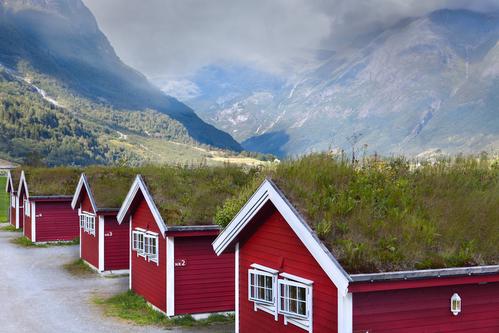In March the French government approved a law that requires all new establishments in commercial zones to include solar panels or green roofs. As it currently stands, France is way behind its neighbouring countries when it comes to renewable energy, but with this most recent policy, it seems the region is making a change for the better.
At the moment, the country has only about 5 gigawatts of solar capacity. When comparing this to their closest neighbour, Germany who boasting over 40 gigawatts of installed solar power, it is hard to see this figure as anything but dismal.
Green roofs and solar investment see France on the right track
Under this law, rooftops on new establishments built in commercial zones in France must have ‘green roofs’ composed of either plants or solar power systems.
There are a multitude of benefits associated with having a green roof. First and foremost, green roofs benefit the building itself. A layer of green plants, like shrubs, grasses and flowers act as insulation for the building, helping to reduce the amount of energy required to heat and cool the internal structure.
Green roofs also provide residents an environment that is not readily available in an urban setting. They also retain rainwater, which then mitigates drainage and runoff problems.
Since plants act as natural filters that reduce air pollution, green roofs will also reduce the degradation of the atmosphere.
Benefits of new French policy include a decrease in air pollution
Green roofs have the capability of decreasing the ‘heat island’ effect. This means that if there are more green rooftops in an urban area, the entire community will benefit. During the day, the temperature in built-up areas increase anywhere from 1.8 degrees to 5.4 degrees more than the surrounding areas. According to the Environmental Protection Agency (EPA), the temperature remains at about 22 degrees warmer at night.
When open green lands are replaced by buildings and cement structures, the ‘heat island’ effect will manifest. The roofs of the buildings absorb more heat during the day than what they can give off at night. Therefore green roofs and solar panels on new buildings will assist in decreasing this effect.
The law, which was approved by the French parliament, was more limited in scope than the original recommendations made by several French environmental activists. They called for the entire roof surface areas of all new building to be covered with plants or rooftop solar panels.
Environmental activists in France successful in influencing change
However, the socialist government were able to negotiate with the activists to modify the scope of the new policy to commercial buildings. In addition, the law was made less difficult for businesses by requiring just a section of the roof to be covered with plants, while also giving building owners the option of installing solar panels instead.
Green roofs are not new; they have already gained popularity in Australia and Germany. The city of Toronto in Ontario, Canada also adopted a by-law in 2009 instilling similar regulations within industrial and residential buildings.
Though the original tenets of the law ware not fully adopted, the final law that was approved is still a step towards the deployment and investment of renewable energy in France.



